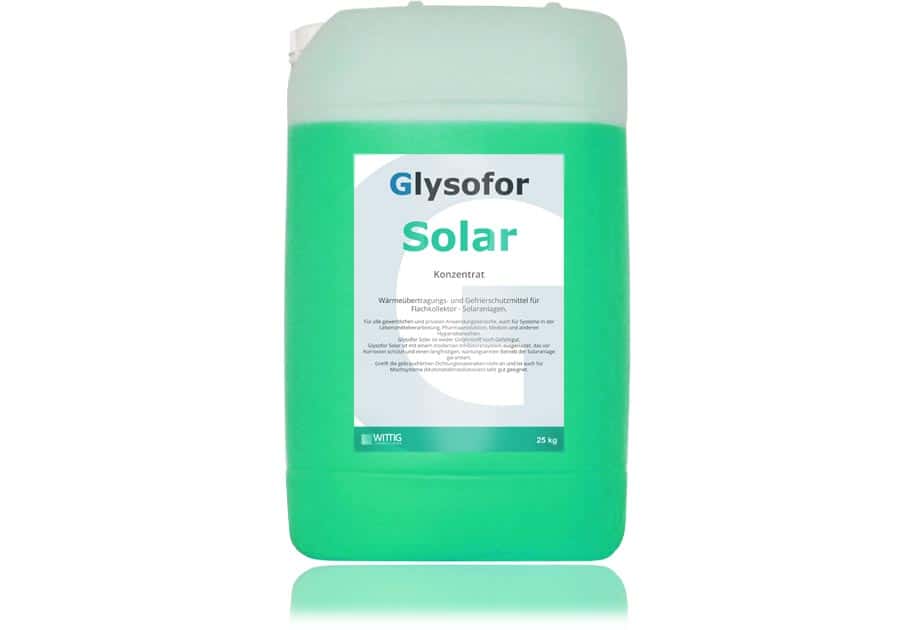Description
Glysofor Solar serves as a frost protection agent, anticorrosive agent and a heat carrier medium in vacuum tube and plate collector solar plants.
Glysofor Solar is an environmentally friendly antifreeze concentrate based on propylene glycol, corrosion inhibitors and stabilisers.
Due to its physiological and ecological harmlessness, Glysofor Solar can be used both in the food and beverage sector as well as in pharmaceutically and ecologically sensitive areas of application.
Glysofor Solar meets the requirements of DIN 4757-1 in terms of the harmlessness of solar heat carriers.
Glysofor Solar optimally prevents frost damage, corrosion, debris, accumulation of mud or biofilms. Glysofor Solar is completely free of nitrites, amines, phosphates, silicates and borates. It is biodegradable and environmentally friendly. Glysofor Solar is delivered as a concentrate and, depending on the desired frost protection value, must be diluted with water. A 1:1 mixture with water can occur as a standard solution, corresponding to a frost resistance of approx. -28 degrees C.

Typical areas of application
Vacuum tube and plate collector solar plants.
Packaging sizes
- 25 kg / 30 kg PE canister
- 220 kg Barrel
- 1.000 kg IBC
- 24.000 kg Tank vehicle
The thermodynamic properties and other specific product features available to download in PDF format.
Antifreeze protection
depending on the concentration
Further information
Glysofor Solar is resistant in the long-term against the formation of biofilms, putrescence and microbiological degradation, thus preventing precipitations and the accumulation of mud. Homogenously mixed Glysofor Solar/water mixtures do not separate, thus ensuring constant frost protection. This guarantees a year-round, long-term and low-maintenance operation of the plants.
As per the valid national and international classification guidelines, Glysofor Solar is not a hazardous substance. There is no toxic effect from the concentrate, nor from its dilution. The product is odourless and dermatologically safe. No irritation occurs that can lead to inflammation of the skin or mucous membrane. Glysofor Solar is free of nitrites, phosphates, borates and amines. The raw materials contained in this product possess the highest possible degree of purity. Glysofor Solar is formulated on a 1.2 propylene glycol base, which fulfils the requirements of the DAB as well as the European Pharmacopoeia and the US Pharmacopeia. As an additive, 1.2 propylene glycol has been approved as per the Ordinance on Additives in Foodstuffs (effective 10/07/1984) as a solvent and extraction agent (BGB1.I S897, Enc. 2, List 9). In the USA, propylene glycol is categorised as a generally harmless food additive (Federal Register, Effective 01/04/1985, § 184.1666). Glysofor Solar is readily biodegradable. Glysofor Solar is classified in the lowest water pollution class WPC 1 (slightly hazardous to water). No workplace-related safety measures are necessary when handling this product. Glysofor Solar is non-flammable; it has not been classified in one of the hazard classes for flammable liquids. Glysofor Solar is not subject to labelling and not considered a hazardous substance in the national / international transport regulations. The delivery container consists of homogeneous PE and can be recycled after use. The product should be stored in a sealed state at all times. Due to the existing, extremely high level of purity, the product should not be decanted or contaminated with other substances.
| Chemical name | 1.2 propylene and higher glycols, Aqua Dest., anticorrosion additives |
|---|---|
| Appearance | Green liquid |
| Packaging | Canisters / barrels / IBCs / tank vehicles |
| ADR | KI 0 Ziff |
| WHC | 1 |
| Labelling | omitted |
Heat transfer medium
When using solar heat, Glysofor Solar transports the heat collected in a solar collector to a heating system. There, the heat is delivered to the corresponding system via a heat exchanger. In this way, drinking water and process water, as well as general heating systems, can be heated in an environmentally friendly and economic way. This can lead to significant fuel savings.
Antifreeze
With a glycol (monopropylene glycol) base, Glysofor Solar significantly lowers the freezing point of water, thus preventing the freezing of operating liquids in solar plants. Glysofor Solar ensures that solar systems can be safely operated, even at minus temperatures. If any damage occurs to the system, a simultaneous frost-related explosive effect can be reliably prevented using Glysofor Solar.
Corrosion protection
Glysofor Solar contains a complex combination of corrosion inhibitors which optimally protect metals from corrosion. This anticorrosive protection can be used for all important metals that are usually used in solar installations. Installations made of copper, brass, solder, grey iron, aluminium, steel and iron are optimally protected against corrosive attacks, even if they are used in multi-metal installations.
Other information
Pure water/glycol mixtures have very distinctive corrosive properties. You must therefore never use pure water/glycol mixtures without inhibitor equipment. In order for the included corrosion inhibitors to be fully effective, the Glysofor Solar must have at least a 25 Vol.-% concentration; this corresponds to frost protection of up to – 10 degrees Celsius. Our products Glysofor N and Glysofor L are available for other areas of application.